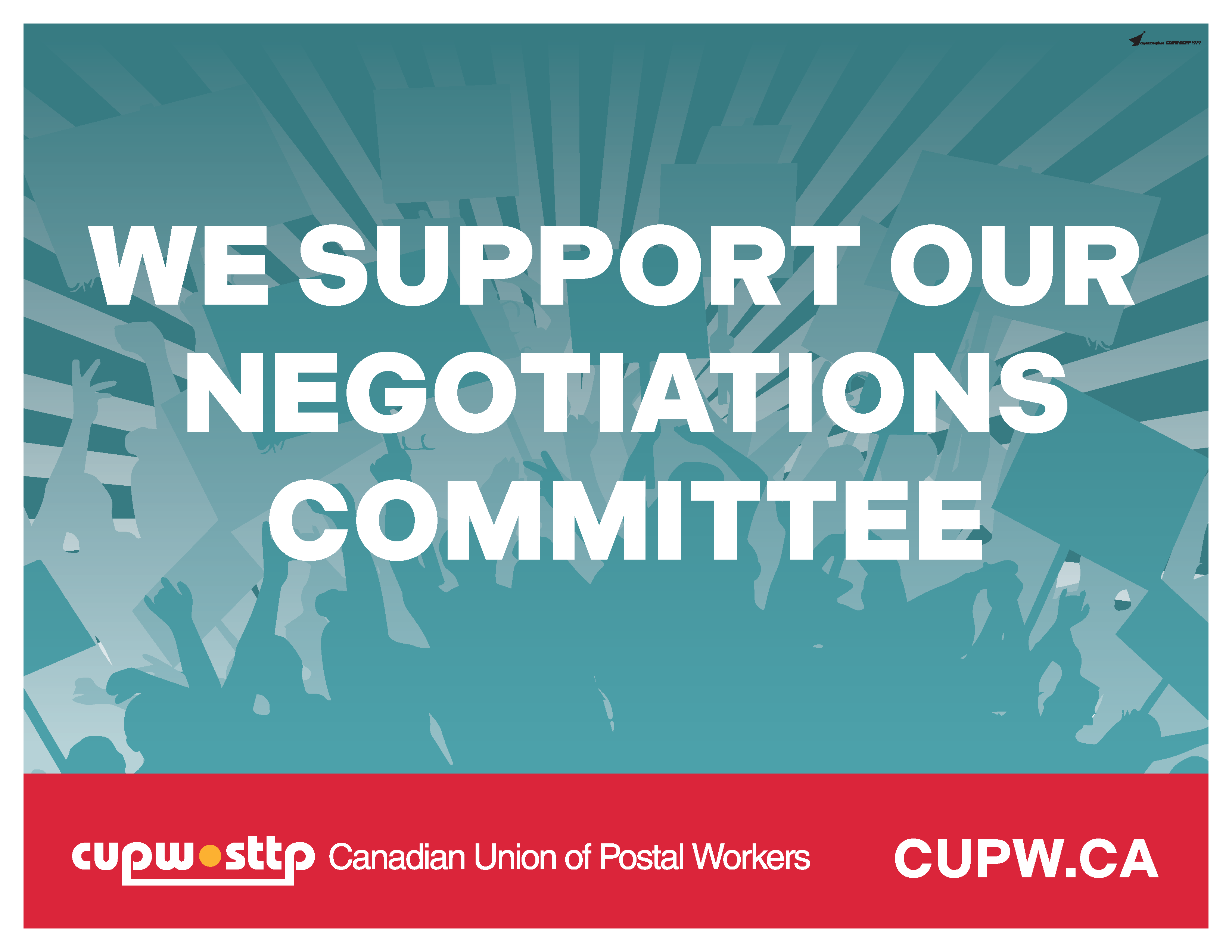(Click on the above to remind all our Members of what we’re fighting for )
Wednesday November 14 2018
Your negotiating committee has now had an opportunity to review and analyze the latest global offer that we received from Canada Post on November 14, 2018 in the afternoon. Canada Post says this latest offer will expire at 11:59 pm on Saturday, November 17, 2018.
Canada Post has made some movements towards addressing our key priorities, however, we have a long way to go to achieve a negotiated collective agreement.
Duration
Canada Post is proposing a four-year collective agreement starting February 1, 2018.
Wages
CPC proposes a 2.0% wage increase for each year of the collective agreement, starting February 1, 2018. A non-pensionable lump sum, paid at signing, to employees actively at work:
- $1000 for full-time employees
- $500 for part-time employees
- $250 for temporary employees
Includes a Cost of Living Allowance protection that triggers at 8% over the last 3 years of the collective agreement.
Temporary employees to progress to the next pay increment when they reach 1000 hours worked in a fiscal year.
Letter Carrier Route Updates
CPC proposes to update the volumes of lettermail, parcels and packets once per year. The update will be based on the Mail Volume Index and PCI index, for parcels and packets, for the previous 12 months. This would include adjusting the percentage of coverage on letter carrier routes. CPC would only adjust the assessed value of the routes if there is a gain in the assessed value. This obligation ends October 31, 2021.
Health and Safety
CPC proposes a combined fund for both units of $10 million to help them become “a model organization in safety”. CPC already has an obligation under the Canada Labour Code to provide health and safety for its employees.
CPC is proposing a ban on compulsory overtime for the duration of the collective agreement.
CPC is not addressing the issue of multi-bundle delivery. The proposal is to expedite the current arbitration in front of Arbitrator Burkett.
Peak Period Temporary Employees
From November to January CPC proposes to use temporary employees to take some of the work off of letter carrier routes. The language provided would allow temporary employees to perform weekend work without first offering it to regular employees.
Service Expansion – Appendix “T”
CPC is proposing a selected set of new financial services. No commitment on what these services might be or when they could be implemented.
Environmental Services
CPC proposed to work together with the Union to develop environmental strategies and a review of all aspects including fleet, buildings, products and services. No firm commitments on frequency of meetings with the Union nor a commitment on reaching objectives.
Job Security – Still Conditional
CPC proposes 40 km protection for all regular employees as of the date of signing. This is conditional upon the Union agreeing to Canada Post’s proposal to hold Group 2 vacant positions in any circumstances; when CPC knows there will be a reduction in positions or when they anticipate having surplus employees. There is no limit as to how long they could hold these vacancies and use temporary employees to cover these positions.
Group 1 (Internal) Staffing – Appendix P
CPC has proposed that the Appendix “P” ratio be calculated using full-time hours worked compared to all hours worked. 78% of these hours shall be full-time hours. CPC is claiming that this could create up to 500 full-time jobs. The catch is that this proposal contains the creation of full-time flex positions that can be scheduled to work a minimum of 4 hours per day and a maximum of 12 hours per day. Employees working on 12 hour shifts would not be entitled to work overtime. These flex full-time employees will be in the PO4 classification but paid the PO5 rate and be allowed to perform PO5 work. Allowing this to happen would be a rollback and is not acceptable. Part-time employees can be required to work up to 10 hours per day and can be scheduled for weekends only. Part-time employees can voluntarily work up to 12 hours per day but this would be at straight time and not overtime rates. Access to these new schedules would not be on a voluntary basis. Employees could be forced into these “flex” positions.
Pension Plan
CPC did not propose any changes to the pension plan during the life of the collective agreement.
They are, however, proposing to review and “find solutions” to the sustainability of our pension plan, short, medium and long-term, based on a study that CPC sponsored.
Now What?
The National Executive Board will be meeting Wednesday evening to determine the next steps. Several important issues have not been addressed. There has been some movement on a few issues but we have a long way to go. Obviously this does not constitute a basis for settlement.
This Still Doesn’t Do It!


